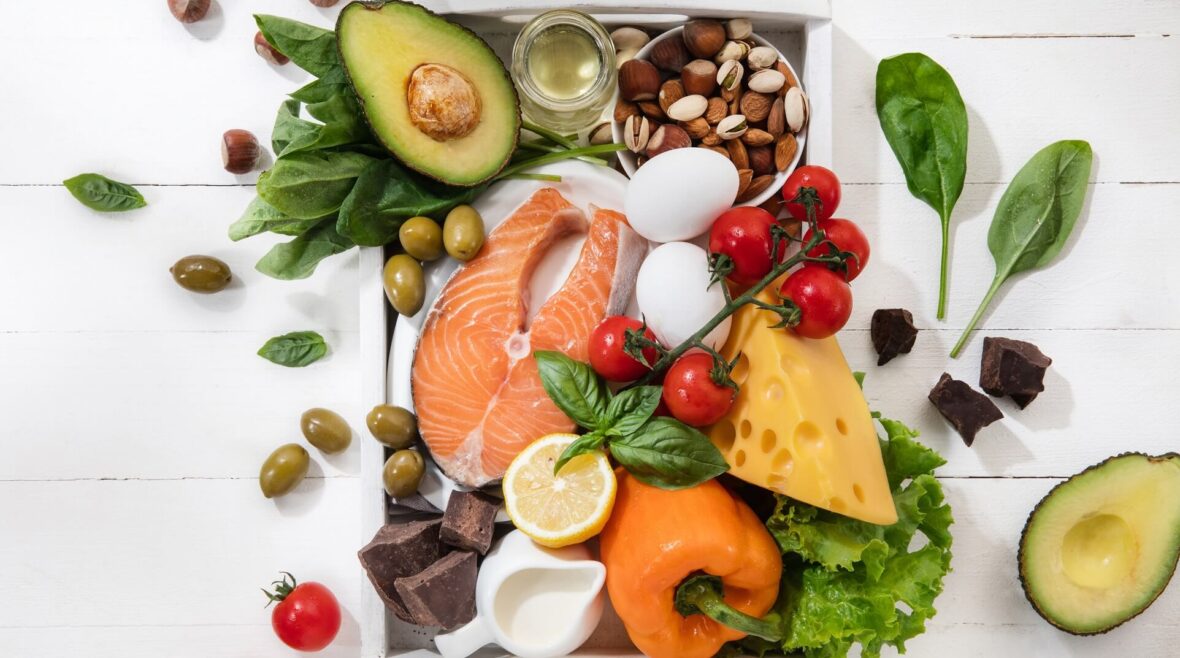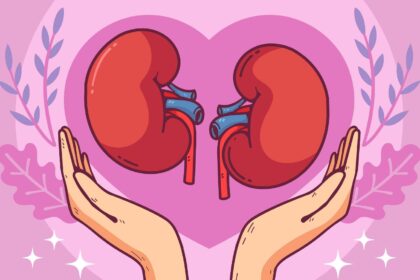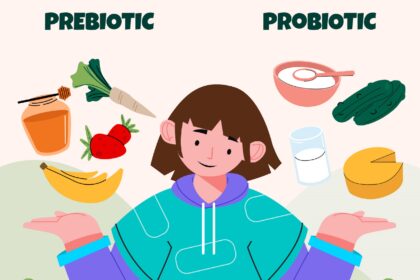Why is Protein essential in your diet, because it’s essential for your bodies to grow and stay healthy. It’s the stuff that makes up your cells, hormones and enzymes, as well as your skin, hair and tissues. You can find protein in a variety of foods, like seafood, meat and nuts, seeds and eggs. Protein is made up of amino acids that are broken down into their individual parts. There are 20 different types of protein, plus 5 non-essential and 6 conditionally essential and 9 essential amino acids. You need to make sure you get the essential amino acids you need from your diet.
This article review why is protein essential in your diet, and its function, symptoms of deficiencies & excess intake, and many more information.
Why is Protein essential in your diet and body?
Protein that you eat gets broken down and reformed into new proteins in your bodies, and they do everything from fighting infections to helping cells divide. Protein requirements mostly depending on lifecycle stage level of physical activity and health status. The amount of protein can get by eating a variety of foods for all, whether omnivorous vegetarian or vegan. Health conditions should be put at risk for protein deficiency or increased protein.
Dietary protein gives you the amino acids you need to make proteins, hormones, and other important molecules, but it doesn’t do it all. Studies show that you need at least a certain amount of protein to avoid a gradual loss of nitrogen each day. Animal-based protein foods usually have enough of the nine essential amino acids to get you through the day. But you can also get them from a variety of plant foods, like rice and beans, hummus, pita bread, or oatmeal with almond butter. Basically, plant-based foods get the same amount of protein and the same amino acid profile as animal-based proteins.
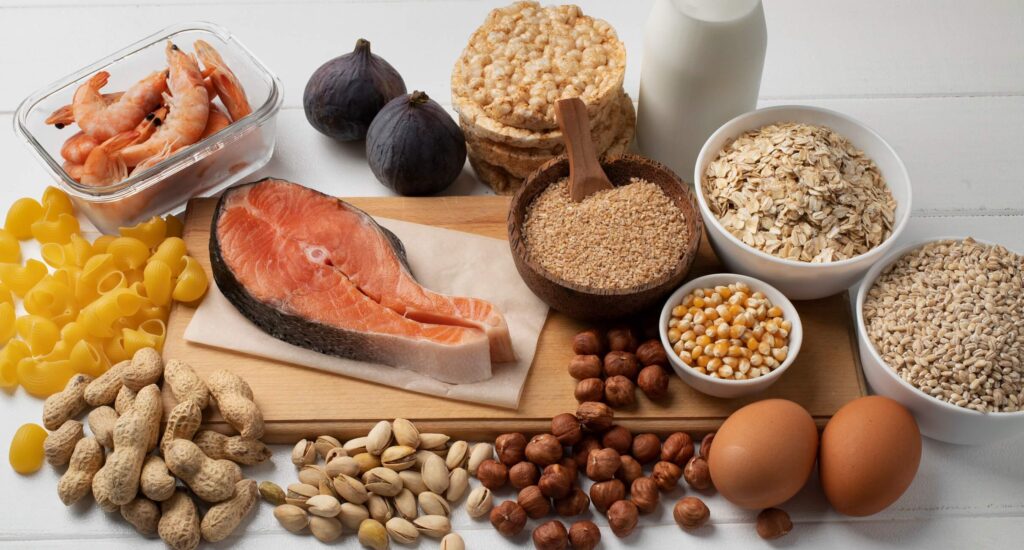
What are protein benefits or functions to the body?
Protein is essential element to your body, and they have various important functions, as listed below:
- Repair and maintenance – Vital in the maintenance of body tissue, including development and repair.
- Energy – Protein is a major source of energy.
- Hormones – Protein is involved in the creation of some hormones. Hormones control body functions that involve the interaction of several organs.
- Enzymes protein – Enzymes are proteins that increase the rate of chemical reactions in the body, these include liver function, stomach digestion, such as digestion enzymes help breakdown food in simple form that your body can easily absorb.
- Transportation & storage of molecules – Protein is a major element in transportation of certain molecules. Protein also assists with the development of new molecules by reading the genetic information stored in DNA. Like hemoglobin, carries oxygen to the body tissue to the lungs.
- Antibodies – Protein forms antibodies that help prevent infection, illness, and disease. Antibodies are form in white cells. This fights against viruses and bacteria, and lower your chances of getting sick.
- Messenger – Hormones protein like a messenger, these proteins are secreted by endocrine cells that act to control or regulate specific physiological processes. They transmit signals one cell to another. Example, hormone protein is insulin which is secreted by the pancreases to regulate level of blood sugar.
- Structural protein – Necessary component of the body, which include collagen, keratin, elastin. Collogen form connective framework of the body muscle, bones and cartilage. Keratin is the main structural component of the hair, nail and skin. Elastin provides resilience and elasticity to tissue and organs.
What are signs of protein deficiency in the body?
Protein plays a vital role in a daily function of your body, and you should intake in a balance diet, otherwise your body will suffer. See below symptoms of protein deficiencies:
- Increase calories – You will feel hungry always. Protein is responsible to keeping correct sugar level in the body. If you don’t get it, glucose level will spike and find a quick and easy solution.
- Muscle mass loss and joint pain – Losing muscle mass and always feeling tiredness, muscle are body’s largest reservoir of the protein. Muscle weakness, pain, loss of mass signs of lack of protein. Protein is essential for muscle growth and maintenance.
- Problems in skin, nails & hair – Weak and brittle nails, & if skin is dry, flaky & cracked, due to lack of protein. Lack of protein will affect hair loss while brushing, thin hair and fad, and stop growth.
- Liver damage – Common symptom of fatty liver, excessive amount of fat accumulate within the liver cells, causing organ to become inflamed.
- Bones fractures – It weaken the bone, thus increasing the risk of bone fractures. Bones contain protein called collagen, and it makes the bones strong and gives them structure. Protein works to maintain the strength of your bones.
- Sleep deprivation – Sleep problems, or loss of sleep.
- Cold, Headaches and frequent illnesses – Frequent headaches may due to anemia and low blood sugar levels. Cold and cough easily infected, due to weaken immune system, may be lack of protein.
- Edema or Swollen feet – Legs are swelling, protein prevent salt and water from leaking out of blood vessels and getting into tissues where they don’t belong.
- Brain fog – You feel motivation, poor memory, trouble learning anything new.
- Depression – Affects lack of neurotransmitters.
- Stunted growth – May stop growth of the body in potential limit.
- Slow healing wounds – Hinders the healing process of your wounds.
What are signs of excess protein in the body?
Balance protein is good for health, and too much intake of protein will not be beneficial to your health, and it may cause some issues to health. See below symptoms of excess protein intake:
- Decreased appetite – Diet may be decreased
- Fluid retention – Swelling in the ankle, if press it feel like a dent
- Fatigue or tiredness
- Foamy urine – Excess protein may damage liver and kidney, and it comes out through urine [foamy urine]
- Bad breath and bad body odor
- Constipation
- Dehydration
- Weight gain
- Gout – More protein may have gas problems and increases gout crystals.
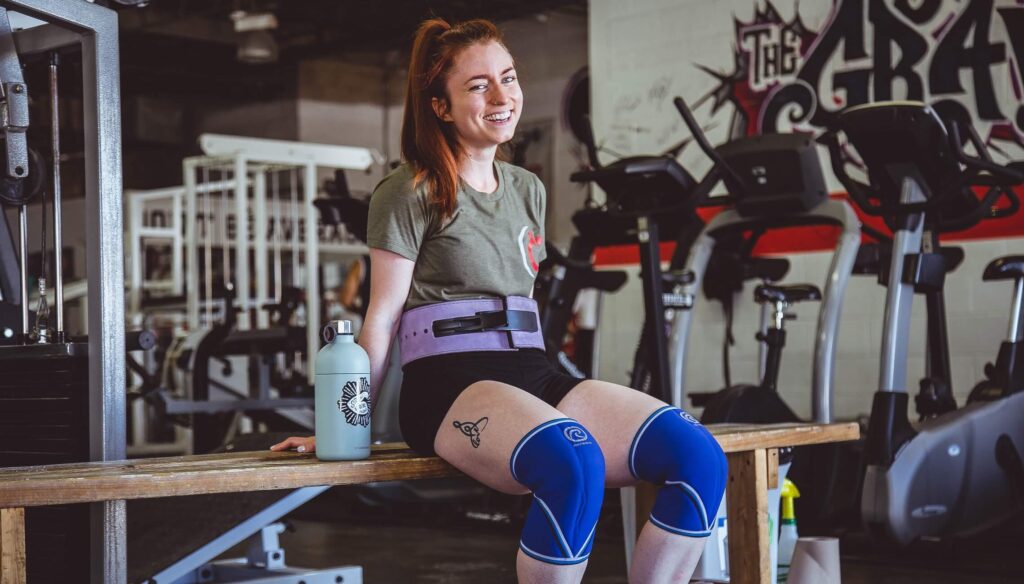
Recommended protein intake:
Protein is essential nutrient for muscles, bones, and rest of your body. In general the recommended protein intake varies from age of the body:
| Grams a day | |
| Babies | 10 |
| School-age kids | 19-34 |
| Teenage boys | 52 |
| Teenage girls | 46 |
| Adult men | 56 |
| Adult women | 46 |
| Adult women – if pregnant or breastfeeding | 71 |
According to medical institute, one should get minimum 10% of daily calories, but not more than 35% from protein.
What are best sources of protein rich foods?
Following list is considered the best sources of protein:
| S. No. | Items | Nutritional significance | Protein contents [approximate amount] |
| 1 | Oats and oatmeal | Healthiest grains to the body include fiber, magnesium, and thiamine | 6 grams per half a cup of dry oats [120 ml] |
| 2 | Milk | Good source of high protein diet, calcium, phosphorous, riboflavin | 8 grams in a cup |
| 3 | Greek yogurt | Without added sugar, full fat Greek yogurt is high in protein but contain more calories | 17 grams per 170 grams |
| 4 | Cottage cheese | Low in fat and calories, rich in calcium, phosphorous, selenium | 28 grams per one cup [226 grams] |
| 5 | Almonds | Rich in essential nutrients, including fiber, vitamin E, manganese & magnesium | 6 grams per 28 grams |
| 6 | Quinoa | Rich in vitamins, minerals, fiber and antioxidants, known as super food | 8-9 grams per cooked cup [240 ml] |
| 7 | Lentils | Best source of plant-based protein | 18 grams per cooked cup [240 ml] |
| 8 | Pumpkin seeds | High in many nutrients, including iron, magnesium, zinc | 9 grams per 28 grams |
| 9 | Chicken breast | Best source of protein-rich foods | 53 grams per roasted chicken breast |
| 10 | Eggs | Best source of vitamins, minerals, healthy fats, eye-protecting antioxidants. Eggs are high in protein, but egg white is almost pure protein | 6 grams in one egg |
| 11 | Lean beef | High in protein, bioavailable iron, vitamin B12, and other vital nutrients | 25 grams per 85 grams |
| 12 | Tuna | Rich source of protein, low in fat and calorie, contains omega-3 fats | 27 grams per 142 grams |
| 13 | Turkey breasts | Contain mostly protein, and have little fat and calorie | 26 grams per 85 grams |
| 14 | Fish [all types] | Rich in essential nutrients, some are high in healthy- heart omega-3 fatty acids | 19 grams per 85 grams |
| 15 | Shrimp | High in various nutrients, low in calories, contains omega-3 fatty acids | 20 grams per 85 grams |
| 16 | Brussels sprouts | High in protein, fiber, vitamin C and other nutrients | 2 grams in a half cup [78 grams] |
| 17 | Peanuts | Rich in protein, fiber and magnesium, and helps to lose weight | 7 grams in a 28 grams |
| 18 | Seitan | Good source of protein made from gluten, main protein is wheat | 25 grams per 100 grams |
| 19 | Soybeans or its products like Tofu, soymilk | Considered a whole source of protein, provides essential amino acids to the body | Tofu contains 10-19 grams per 100 grams, & soymilk contain 7 grams per cup [240 ml] |
| 20 | Green peas | Contains good amount of protein | 9 grams per cooked cup [240 ml] |
| 21 | Spirulina | Blue-green algae known as nutritional powerhouse, complete protein, and iron, thiamin and copper needs | 8 grams from 30 ml |
| 22 | Chia seeds | Good source of iron, calcium, omega-3 fatty acids, antioxidants and other nutrients | 6 grams per 35 grams |
| 23 | Nuts & other seeds | Great source of protein, including iron, calcium, magnesium, vitamin E, antioxidants and other nutrients | 5-7 grams per 28 grams |
| 24 | Whey protein supplements | High quality protein from dairy foods that helps in building muscle mass, may aid weight loss | 20-50 grams per serving |
| 25 | Fruits and vegetables | Mostly all fruits and vegetables contains more or less amount of protein, like broccoli, asparagus, potatoes, sweet potatoes, Brussels sprouts | 4-5 grams per cooked cup |
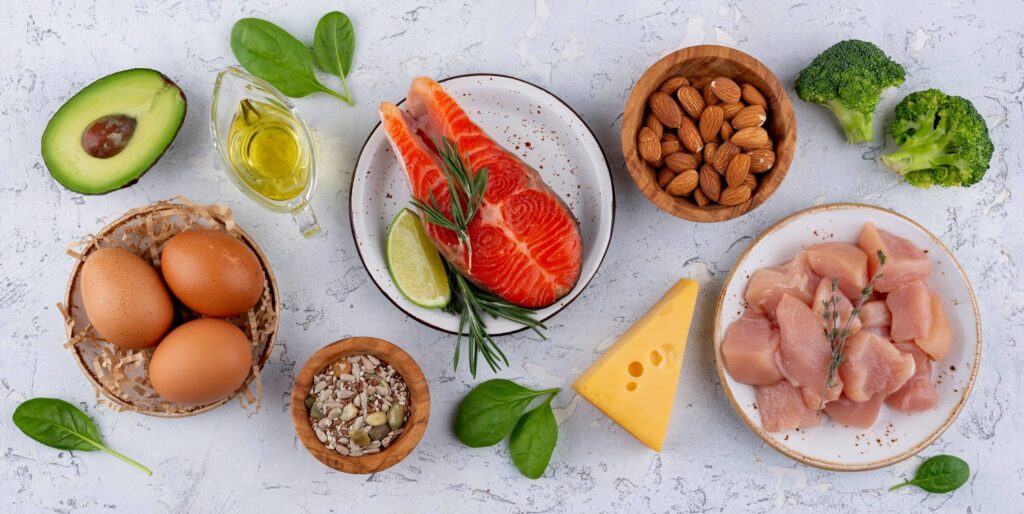
Can you get enough protein on a vegan or plant-based diet?
It is possible to obtain a sufficient amount of protein from a vegan or vegetarian diet by including a range of plant-derived protein sources in meals. Examples of protein-rich plant-based foods for vegans include legumes such as beans, lentil, chickpea, and tofu, as well as tempeh and seitan. Additionally, nutritionally balanced and nutritious whole grains can provide additional protein. Therefore, it is essential to plan meals carefully to ensure that one is meeting their protein requirements and to consult with a Registered Dietitian for advice on how to ensure a balanced and protein-rich dietary plan.
How does protein help with muscle building and recovery after exercise?
Protein plays an important role in muscle growth and post-workout recovery. The main reason for this is the amino acid content of protein. Muscle tissue undergoes micro-tears during physical activity, particularly resistance training, and protein helps to repair and rebuild these tissues. Post-workout protein consumption stimulates the production of muscle protein, which is necessary for muscle growth. Protein also reduces muscle soreness and accelerates post-exercise recovery, allowing you to perform better in subsequent workouts. Eating a high-protein meal or supplement within a few hours post-workout can help support these processes and support muscle growth and repair.
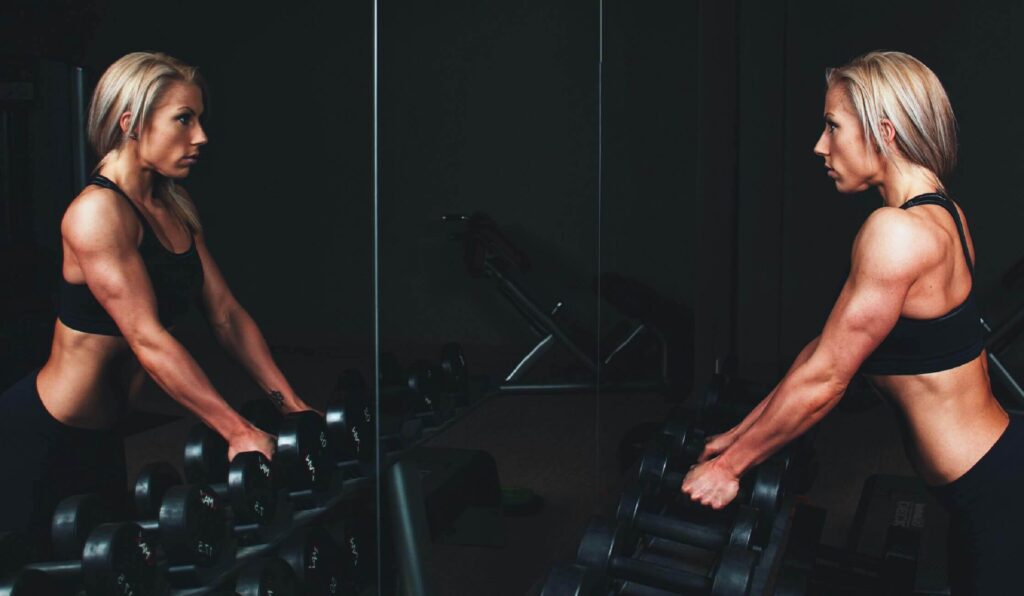
Are there any potential side effects or risks associated with consuming too much protein?
Excessive protein intake, especially when it’s consumed in excess of the body’s needs, can have several side effects and risks, including:
- Kidney strain: Excessive protein intake increases the workload on your kidneys, which can lead to kidney issues in people with pre-existing kidney problems.
- Digestive discomfort: High-protein diets may lead to digestive discomfort, including constipation or diarrhea.
- Nutrient imbalances: Excess protein can cause nutrient imbalances in your diet if it replaces a balanced diet.
- It’s important to balance your protein intake, meet your dietary needs, and consult with a healthcare professional, or a registered dietitian, if you are concerned about excessive protein consumption.
Conclusion:
Proteins are considered building blocks of organs, skin, muscles and hormones, and body required protein to maintain and repair tissues. It can also help in lose weight. These are extremely composite molecules present in all living organisms, and made up of amino acids linked by peptide bonds. These are classified in numerous ways, such as based on their function, chemical nature and solubility properties, and nutritional importance. This is clear that Protein play important role to function your body properly. In order to maintain the balance amount of Protein, you should consume only healthy and nutritional diet, if possible.
FAQ
What is protein and why is it important for the body?
Protein is the stuff your body needs to function properly. It’s made of amino acids that are essential for life. It helps your body repair and grow, make enzymes, hormones, and keep your immune system strong. Plus, it gives you energy when you don’t have enough carbs or fats, so it’s a must-have for a healthy diet.
How much protein do I need in my daily diet?
The amount of protein consumed in a daily diet is contingent upon a variety of factors, including age, gender, physical activity level, and health objectives. Generally, however, it is recommended that adults consume between 0.8 and 1.0 grams of protein per kg of body weight on a daily basis. Athletes or those seeking to build muscle may necessitate a higher protein intake, which is typically between 1.2 and 2.2 grams per kg, but it is recommended to consult a healthcare professional or a registered dietitian to make personalized recommendations based on individual needs.
What are the best food sources of protein for vegetarians?
If you’re a vegetarian, you’ve got plenty of choices when it comes to getting protein from plants. Legumes are a great place to start, as they’re packed with protein, fiber, and minerals. But if you’re looking for something a bit more versatile, you should check out tofu and tempeh. You can also get protein from nuts, seeds, whole grains, quinoa, and farro – all of which are great sources of protein.
What are the benefits of consuming protein shakes or supplements?
If you’re having trouble getting enough protein each day from whole foods, protein shakes and supplements might be a good option. They’re a quick and easy way to get more protein, which can help your muscles recover and grow if you’re doing regular exercise or training. But make sure you use them as a supplement, not as a substitute for whole foods. Whole foods have a wider variety of nutrients and fiber, which are important for your overall health. Talk to your doctor or dietitian to figure out if protein shakes and supplements are right for you and your fitness goals.
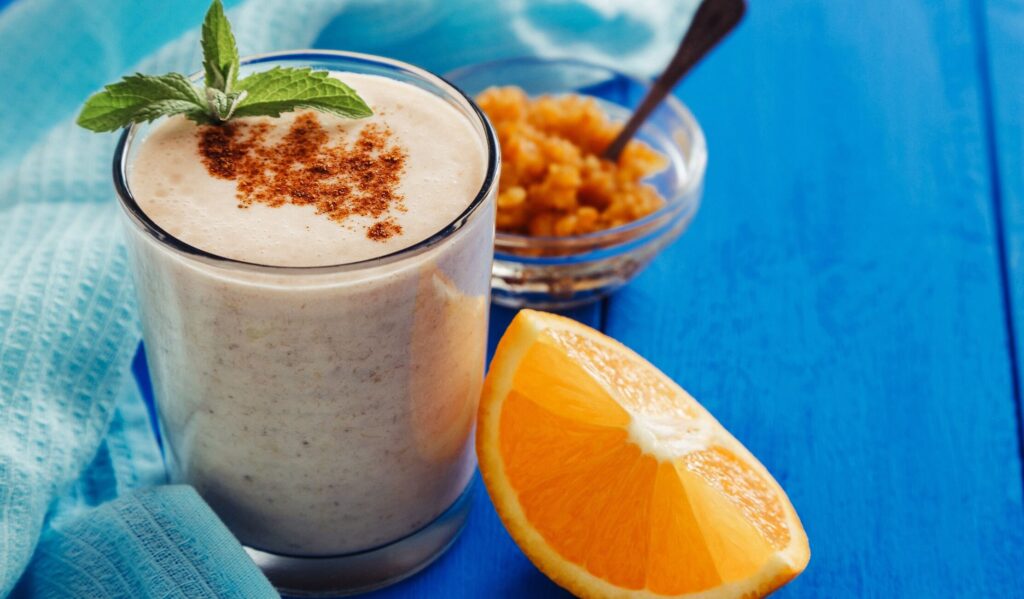
What are the differences between complete and incomplete proteins?
Complete proteins are those that contain all the necessary amino acids in a sufficient amount, thus providing a superior source of protein. These proteins are typically derived from animal sources, such as meat, fish and eggs, as well as dairy products. Conversely, incomplete proteins contain one or more of the necessary amino acids, or lack them in a sufficient amount. These are typically derived from plant sources, including beans, cereals, nuts and vegetables. For vegetarian or vegan diets, it is important to balance the amino acid profile of incomplete proteins by combining them with other incomplete protein sources, a process commonly referred to as complementary protein pairing.
Reference Used:
https://www.webmd.com/food-recipes/protein
https://www.healthline.com/nutrition/protein-for-vegans-vegetarians#TOC_TITLE_HDR_18
https://www.healthline.com/nutrition/20-delicious-high-protein-foods#TOC_TITLE_HDR_2


